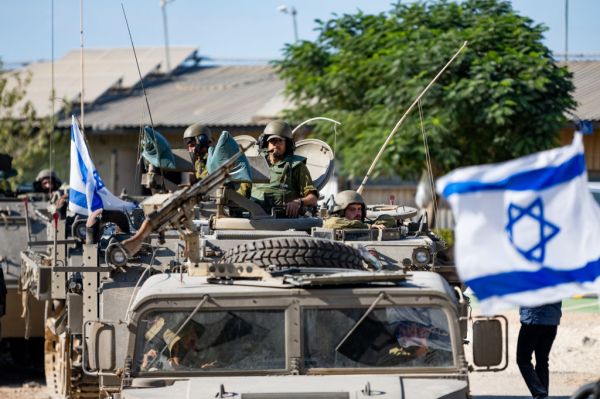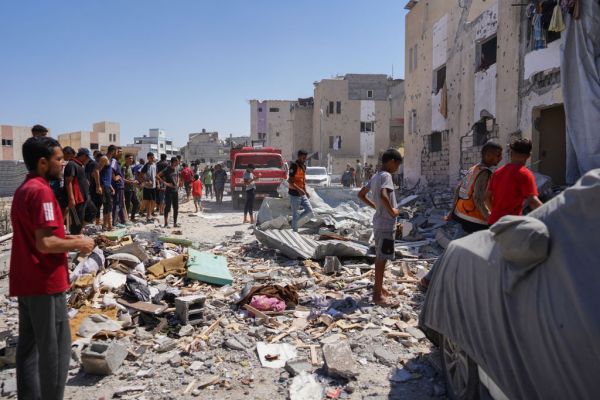It’s impossible to know with certainty just how many Palestinians have died since Hamas terrorists killed about 1,200 Israelis on October 7. The official number as of this week totaled 17,700, but keeping track of the living and the dead is complicated amid the fog of war. The Hamas-run Gaza Health Ministry doesn’t differentiate between militants and civilians—or whether the dead were killed by Israeli or Hamas forces—but outside estimates suggest that in past conflicts, about two-thirds of casualties were noncombatants.
No matter the precise tally, nobody’s life is safe in war. Even the most peaceful civilian meticulously following an evacuation plan is just a stray bullet or a piece of falling masonry away from doom.
I count myself fortunate to not live in Gaza. Although I am a Palestinian myself, I’ve lived a peaceful life in Britain, without any terrorist groups firing rockets overhead, and without Israeli F-16s dropping bombs from above. But even from afar, it’s been shocking to watch this conflict unfold. On October 7: the charred corpses, the burnt vehicles, the mounds of bloodied bodies slaughtered at a music festival. In the weeks afterward: destroyed buildings turned to rubble, smoldering craters in the ground, and videos of pulverized and bloodied bodies in overcrowded hospitals.
Such footage—throughout the conflict, of Israelis and Palestinians alike—doesn’t feel like it was shot on Earth. It feels like a scene of a Bruegel painting, like a sprawling medieval depiction of hell. But it isn’t a painting or a nightmare. The destruction in Israel and Gaza is real.
For the last 17 years, Palestinians have been split between the West Bank, ruled by Mahmoud Abbas of Fatah, and Gaza, ruled by Hamas, whose goal is to violently reconquer all of the land between the Jordan River and the Mediterranean Sea. Israel, meanwhile, has been ruled largely by the uncompromising Benjamin Netanyahu, who in 2019 reportedly told a private meeting of the Israeli right-wing party Likud that “bolstering Hamas” was “part of his strategy.” Doing so, per the Jerusalem Post’s reporting, would in Netanyahu’s assessment “maintain a separation between the [Palestinian Authority] in the West Bank and Hamas in Gaza” in order to “prevent the establishment of a Palestinian state.”
And tragically, Palestinian support for the peace process is declining. A recent study by Birzeit University in the West Bank—which surveyed the Palestinian population between October 31 and November 7—found that 75 percent of Palestinians supported the October 7 terrorist attacks, and that 90 percent believe coexistence between Israelis and Palestinians is impossible. The same study found that 75 percent of Palestinians believe they will repel the ongoing ground offensive and win the war against Israel.
This poll, conducted by Palestinian researchers interviewing Palestinian citizens, shows that a majority want to fight Israel and believe themselves capable of a military victory. While 90 percent of Gazans in the same survey support a ceasefire, this could very well be a temporary measure to offer Palestinian civilians respite from the war—and to give Hamas a chance to recalibrate, rearm, and continue attacking Israel.
In Gaza, support for Hamas more generally remains overwhelmingly high. Eighty-nine percent of respondents expressed support for the al-Qassam brigades—Hamas’ armed wing—and 84 percent expressed support for Palestinian Islamic Jihad. About 3 in 4 expressed support for the political wing of Hamas, compared to just 23 percent who backed Hamas’ main political rival, Fatah.
There hasn’t been an election in Gaza since 2006, but if one was held today, Hamas would win in a landslide. For those looking for signs of peace on the horizon, these figures are almost as grim as the ashy destruction in Gaza itself.
What explains this prevalent support for Hamas?
Is this just wartime bravado? Palestinians take pride in clinging onto our homes, even in the face of a militarily and technologically advanced foe like Israel. Our folklore is riddled with stories of the wars we have survived, and the empires—British, Ottoman, Christian European crusaders—that have come and gone from the land. Palestinians tend to view the Israeli occupation as a temporary phenomenon that will one day pass. This war, as terrible as it is, will become just another layer of Palestinian folklore and mythology, another story of survival to hand down to our children and grandchildren.
Is it an expression of Arab tribal honor culture? The Palestinian identity is a complex mixture of nationalistic and tribal elements. Arab tribal honor culture places a strong emphasis on family and group loyalty. By expressing a strong belief in Palestinian victory, Palestinians are demonstrating loyalty to their people, their tribe, and their place in the land.
Is it fear of speaking out against Hamas? During its time in power, Hamas has violently subjugated and intimidated Palestinians who have spoken out against their authority. Indeed, the group’s rule of Gaza essentially began with a coup d’etat and the killing of more than 100 Fatah members. Hamas has instituted anti-normalization laws that prevent Palestinians from even speaking to Israelis about the possibility of peace, as this is seen as a betrayal of the collective struggle for statehood and land. Indeed, Palestinian peace activists have been arrested and jailed in Gaza in recent years simply for holding Zoom calls with their Israeli counterparts. Those opposed to the war against Israel may understandably be terrified of speaking out against Hamas or questioning its actions.
Is it antisemitism? In a 2014 poll conducted by the Anti-Defamation League, 93 percent of Palestinians overall were found to agree with one or more antisemitic statements, with 88 percent agreeing with the statement that “Jews have too much control over global affairs,” 78 percent agreeing with the statement that “Jews are responsible for most of the world’s wars”, and 89 percent agreeing with the statement that “Jews have too much power in international financial markets.” Nearly nine in ten respondents in the survey believed “people hate Jews because of the way Jews behave.”
Or is it some blend of all the above, combined with the incoherent wailing of a desperate, traumatized people? According to the aforementioned Birzeit University study, 14 percent of Palestinian respondents had lost “at least one immediate relative” during this specific conflict. And 100 percent of Gazans questioned in the poll said “there is no safe space for them or their families in Gaza.” In such a heated environment, calmer voices are unlikely to prevail.
But by the same token, public opinion in Israel has similarly hardened. According to a poll conducted in late October by Tel Aviv University, about 58 percent of Israeli Jews believed the Israel Defense Forces (IDF) was using too little firepower in Gaza, compared to just 2 percent who believed the IDF was using too much.
In the same survey, support for peace negotiations with the Palestinian Authority among Israeli Jews fell from 48 percent in favor in September to just 25 percent in the last week of October. It’s not surprising to see Netanyahu proclaim his goals are to continue the war against Hamas “until the end” and until “total victory” is achieved.
In 1967, Israel defeated the armies of Egypt, Syria, and Jordan in six days on the battlefield. After the shock of the initial attack, Israel needed just 18 days to defeat Egypt and Syria in the 1973 Yom Kippur War. But this latest conflict, now 65 days in, shows no signs of stopping. The Israeli military has captured Gaza City and is pushing south, but Hamas continues to fire rockets into Israel.
Of course, this war is much dirtier and more complicated than those previous conflicts. This time, Israel is up against an asymmetric enemy, hidden among a civilian population and dug into tunnels hidden underneath civilian infrastructure. Netanyahu has promised an Israeli military occupation of Gaza at the conclusion of the war, and Palestinian support for Hamas and October 7 remains high. The tide will not turn quickly, and there’s no easy path forward.
But I would suggest that the best strategy for Palestinians is to ditch Hamas’ own maximalist demands and to work toward negotiating for peace. To undermine the uncompromising position of Netanyahu and his allies, start arguing that compromise is possible. Start arguing for a new peace negotiation working toward a two-state solution, and for a truth and reconciliation process that would allow both Palestinians and Israelis to express legitimate grievances and start to heal the wounds that have been inflicted over the past century of conflict.
If Palestinian public opinion does not change path, the abyss beckons. The Palestinian Authority and the U.N. Refugees and Works Agency that looks after the multigenerational Palestinian refugees are propped up by foreign aid budgets. If the Palestinian people support the attacks of October 7, and wish to fight Israel to the very last, will they continue to receive support from the international community? I very much doubt it.
Palestinians in Gaza (or the West Bank for that matter) do not wish to be militarily occupied by Israel. Israelis, of course, do not want to live next to another iteration of Hamas—and as the current war is showing, they have the military means and might to get what they want. The basic desire of Palestinians to live in a state called Palestine, free and self-determining, is valid. We are above all else human beings, just as human as anyone else, with just the same right to life and liberty.
The status quo of instability and perennial outbreaks of war and terror is as unsustainable as it is horrifying. Nobody—aside from the most ghoulish, uncompromising ideologue—wishes for us, the people of the holy land, to live in hell like this.








Please note that we at The Dispatch hold ourselves, our work, and our commenters to a higher standard than other places on the internet. We welcome comments that foster genuine debate or discussion—including comments critical of us or our work—but responses that include ad hominem attacks on fellow Dispatch members or are intended to stoke fear and anger may be moderated.